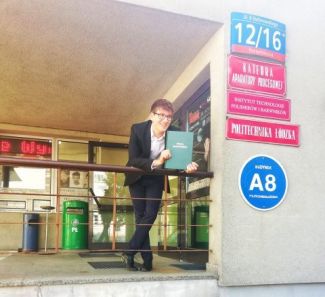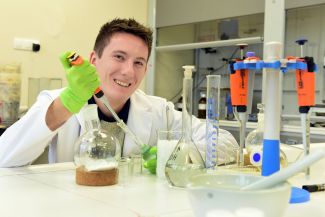He is already an accomplished chemist – the winner of the Diamond Grant of the Ministry of Science and Higher Education, Rector's award for the youngest first author of a scientific publication, author of the best thesis. He passionately talks about the research he conducts at the TUL Interdisciplinary Doctoral School in order to make the world more ecological with the help of chemistry.
When was the passion for science born?
A real scientific passion was probably born when, together with our friends, we started participating in various scientific volunteering activities. Back then, we simply participated in the research carried out by TUL employees. What's funny, my first volunteer work was with my friend on vacation after the first year of studies! At that time, I was not working on biodegradable polymer composites yet. The first research I participated in concerned nanotubes, graphene and rubber dust. Then I realized them in a completely different team - with Prof. Dariusz Bieliński.
What scientific discipline do you deal with?
I deal with chemical sciences. I have the impression that in recent times we associate chemistry with only bad things, e.g. food preservatives, cancer chemotherapy, flooding us with waste from everywhere, but this is just a small part! Chemistry just surrounds us. All matter is made of atoms and molecules. For me, chemistry is the reality around us, and I see its creation as the main goal of my research.
What is your research about?
From the very beginning I've been dealing with plastics containing natural cellulose fibres, but I analyse more and more aspects in my research. As it happens in a scientist's work, very often everything goes differently than it should - then problems and new questions arise, and I try to answer them in subsequent projects. In my thesis, together with dr hab. inż. Anna Masek, assoc. prof. we proposed a hybrid method of chemical modification of cellulose using solvents of different polarity. The effect of the modification exceeded our expectations! There was even a patent application related to the developed method. Therefore, my doctoral dissertation is based on advanced research and computational methods to explain all occurring reactions and phenomena during the innovative modification of cellulose.
What goals do you want to achieve with the Diamond Grant?
In this project I am still involved in the methods of hydrophobization of cellulose, but here we put more emphasis on observing possible changes in the structure of natural fibres in order to better understand the processes occurring during the application of cellulose in plastics. Much more than in my previous projects, the scientific aspect of my research will be addressed here. Apart from chemical modification of cellulose, the main aim of the project is to check the statistical significance and repeatability of the analysed processes, in which I am supported by dr inż. Katarzyna Dems-Rudnicka, from the Centre of Mathematics and Physics at Lodz University of Technology. The project is a kind of bridge between two scientific disciplines: chemistry and mathematics. Such an interdisciplinary combination of the two disciplines will allow for an innovative description of the results of the conducted analyses. Let us only hope that everything will go according to plan.
Where will we see the effects of cellulose hydrophobization in everyday life?
Materials containing natural additives may show increased degradation potential. This does not mean that they will decompose right away, but if we want to dispose of them, it will be much easier. I hope that in the future this type of plastics will be used mainly as packaging materials, but I also believe that they will find applications in many other industries, e.g. in the furniture, aviation, automotive industries, or as elements of sports equipment.
Ecology is present in your scientific work. And what does it look like in everyday life?
I segregate rubbish. I use a water filter to avoid buying large packets. If I buy a drink in a bottle, I try to use it again and again. Similarly, with foils. I use cloth bags or cardboard boxes. I pay attention to what products I buy and what material their packaging is made of. I turn off unnecessarily lit lights or remove plugs from sockets. These are the first things that came to mind. I think these are simple activities that anyone can and should do. I am especially sensitive when people give up these activities just for the sake of their convenience. I must admit that sometimes these activities do not come so easily to me and require a bit of effort, a moment of reflection or dedication of time, but it's just like many other things that I do in my life ... And I don't give up on them.
How could you convince the unconvinced that taking care of the environment is worthwhile and profitable?
I think convincing the unconvinced is a separate matter. I have had a lot of such discussions myself and I still haven't found a good solution. Nevertheless, once a good friend of mine (best regards!) told me an analogy that I liked very much. We are currently living in a time of progressive climate change and increasing environmental pollution. It can be compared to someone shooting at us. If the bullet hits - we will die. However, there is a difference in whether the attacker is standing somewhere far away or holding a gun to our head. In the first situation we have time to react and the bullet may miss. In the latter, everything happens in a split second and we die on the spot. It is our actions that regulate the distance of the attacker.
Why is it worth being a scientist?
Certainly not for the sake of a title of a scientist. It's about more than that... about answering the questions no one has answered yet. About searching for the truth and proving it step by step. About creating something new - something that didn't exist before at all. In this sense science is very similar to art. Science also relies on a kind of artistic creativity and requires a huge amount of imagination or a mind open to the constantly changing world.



